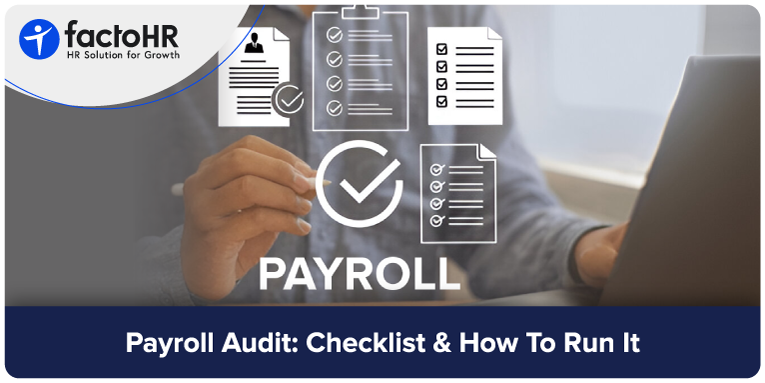Payroll Audit: Checklist & How to Run It

Table of Contents
What can organizations do to cope with complex payroll processes and stay compliant? To solve these challenges, modern organizations need to implement a strong payroll management system to prevent payroll-related mistakes. The traditional payroll process involved paper-based methods for data entry, and HR professionals would manually maintain spreadsheets. Payroll management software has become a great replacement for traditional payroll processing.
Payroll management is crucial for any business, as it enables the accurate calculation of payroll and ensures timely payments to employees. This accuracy helps in payroll audits and maintains compliance with various labor laws. This article discusses various benefits of conducting payroll audits, along with a checklist to follow during the audit process.
What is Payroll Audit?
A payroll audit is a review process of an organization’s payroll processing to ensure accuracy. The audit process is undertaken to verify that the financial records are accurate and maintain compliance with labor laws. It verifies employee records and their salary calculations, which also includes tax deductions. The payroll audit process is conducted at least annually to verify that the processes are up-to-date and accurate.
Payroll audits examine various payroll components, like employees’ hours worked and benefits administration. The objective is to identify any errors that could lead to legal issues or financial penalties for organizations. We have mentioned the two types of payroll audit plans to help you better understand the topic.

Types of Payroll Audits
Internal Payroll Audits
Payroll audits can be conducted internally by an organization’s audit department. An HR professional or payroll team can perform the process. It includes identifying potential issues and taking corrective actions. This process is carried out before the external audit starts and helps maintain proper compliance.
External Payroll Audits
External payroll audits are conducted by professionals, such as Certified Public Accountants (CPAs) or certified auditors. The review process is structured and unbiased, which helps find accurate results with the payroll process. This process can be time-consuming and expensive, but it enables companies to identify issues that internal auditors might overlook.
What are the Benefits of Conducting Regular Payroll Audits?
Payroll audits are essential for organizations to guarantee accurate payroll processing. There are several benefits to conducting regular payroll audits, which are outlined below.
Enhanced Transparency and Accountability
When organizations conduct payroll audits regularly, it maintains fairness and transparency in payroll processing. The process becomes open and transparent by maintaining proper compliance with relevant laws and regulations. When payroll-related information is accessible to auditors, they can identify errors, and actions can be taken against miscalculations. Corrective actions are taken to help establish a system of transparency and accountability.
Reduced Risk of Penalties and Legal Issues
The audit process can identify errors and financial fraud, helping companies take corrective actions before the issue escalates. Payroll compliance refers to the adherence to various labor laws and tax regulations that organizations must follow to maintain compliance. Some malpractices, such as duplicate payments and unauthorized payroll-related changes, can be identified, which helps companies reduce the risk of penalties.
Improved Employee Trust and Satisfaction
Payroll audits help identify errors and take corrective actions, ensuring that employees receive accurate salaries on time. As the payroll policies are communicated openly, it helps build trust and reduce misunderstandings. Some issues, such as missed reimbursements or incorrect deductions, can be identified, and corrective actions can be taken to resolve them. The audit process helps employees trust their organization and improve their overall satisfaction.
Better Data Hygiene and Record-Keeping
The audit process can detect mistakes and irregularities in wage calculations. Proper record-keeping helps ensure compliance with rules and regulations. Every state in India enforces a minimum wage policy that must be followed. If organizations fail to comply with these wage laws, they face legal penalties, which can damage their brand image. Reporting is streamlined with proper record-keeping, easing administrative responsibilities.
Operational Efficiency and Improved Decision-Making
Operational efficiency can be improved by having a payroll audit process at least once a year. It identifies errors and helps organizations verify that accurate payroll calculations are made. The audit process can identify areas of inefficiency and allows for taking actions to resolve these issues. Some of the solutions are simplified workflows and fast processing times. The insights generated from audits reveal various trends that facilitate data-driven decision-making.

Payroll Audit Checklist
When companies prepare for a payroll audit checklist, a structured approach is required. This ensures that all essential records are accurate and readily accessible. Below is a step-by-step guide for a payroll audit checklist.
Set Audit Timeline and Scope
The timeline for the payroll audit process is not always set. Note that if the company is experiencing issues with its payroll processing, it can conduct an audit on a quarterly or semi-annual basis. Most companies perform their audit process at the end of the fiscal year. Also, companies should plan specific areas in payroll processes that will be examined.
Create an Audit Plan
Organizations need to define objectives and the areas that are supposed to be reviewed when creating an audit plan. The objective should be to achieve accurate employee payroll and maintain proper compliance with labor laws.
Collect Payroll Records
To initiate the process, it is necessary to gather relevant documents and payroll records, including employee records and tax filings. When all the documents are stored in one place, auditing and cross-referencing become easy. Furthermore, organizations must ensure that documents, such as employment contracts and wage records, cover the entire audit period.
Verify Employee Data
Employment records and personal information are among the data that require verification. This information verifies details, such as employee classification and tax filing status. All of these details should ensure that everything is up to date. Organizations can support payroll security and help take action against miscalculations.
Review Hours Worked and Pay
Once the employee’s data has been verified, the next step is to match their hours worked and wages. HR systems and employment contracts verify employees’ wages and other terms and conditions of employment. Sometimes, employees would also get a bonus and commission based on their performance, which should be included in the audit process. This step ensures that employees receive payment in accordance with state and federal employment laws.
Audit Deductions and Tax Withholdings
Audit deductions and tax with holdings should comply with employment laws. Organizations should verify that these deductions adhere to both state and federal laws. Note that deductions for benefits and retirement plans are compliant with various rules. These tax withholdings and payments should be documented properly to avoid any delays in the audit process.
Reconcile Payroll with Financial Records
Reconciling payroll with financial records, such as employees’ deductions and tax withholdings, is crucial for future reference. These financial records should have entries in the general ledger and bank statements. These records should be compared with the amount withdrawn from banks for payment and the accounting software as well.
Document Findings and Correct Errors
This step helps identify payroll errors that can be detected during the audit process and provides corrective actions to address them. It is advised to keep a detailed record of the procedure and the measures taken to solve it. This enables organizations to access data or refer to these records during future audit processes.

What are the Tools and Technologies that Support Payroll Audits?
Various tools and technologies support payroll audits, making the process more efficient for companies. These are mentioned below:
HRMS and Payroll Software with Audit Trails
A Human Resource Management System (HRMS) and payroll software can support payroll auditing. This software helps centralize data and maintains accuracy for smooth audit processing. Almost every organization implements this software as it helps maintain proper compliance with labor laws and track tax deductions.
Real-Time Dashboards and Analytics
Payroll audits can be made easier with various insights available through real-time dashboards and analytics. It helps identify and take corrective actions to improve the audit process. When organizations have access to insights, they can make data-driven decisions and enhance operational efficiency.
Automated Report Generation and Alerts
Automated report generation helps reduce manual efforts and avoid errors due to increased accuracy. Some of the reports that can be generated are employee payments and deductions reports. Auditors can conduct the process without intervention as the data is accurate and complete.
Integration with Accounting and Compliance Tools
When accounting and compliance reporting tools are integrated with payroll auditing, it helps simplify the process. It can confirm payroll-related data with the reconciled financial records and help maintain data consistency. The tools help reduce the chance of manual errors and maintain proper compliance with regulations.

Conclusion
Payroll audits are important for any organization, as they ensure financial and legal compliance. The audit process makes sure that the payroll process complies with various rules and regulations. This approach helps organizations steer clear of legal penalties while also fostering trust among employees, thanks to a compliant work environment.
Organizations should prioritize making payroll auditing a routine process, which will facilitate efficient payroll management. factoHR’s payroll software simplifies payroll-related processes and supports compliance with multiple labor laws. The software features include reporting capabilities and audit trails, which help increase operational efficiency. Schedule a demo to know more!
Grow your business with factoHR today
Focus on the significant decision-making tasks, transfer all your common repetitive HR tasks to factoHR and see the things falling into their place.

© 2026 Copyright factoHR


